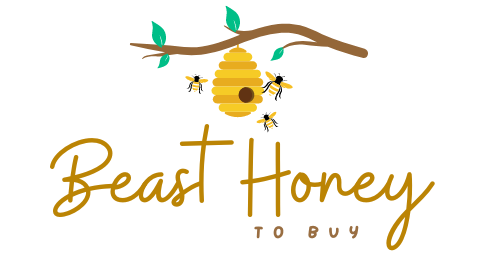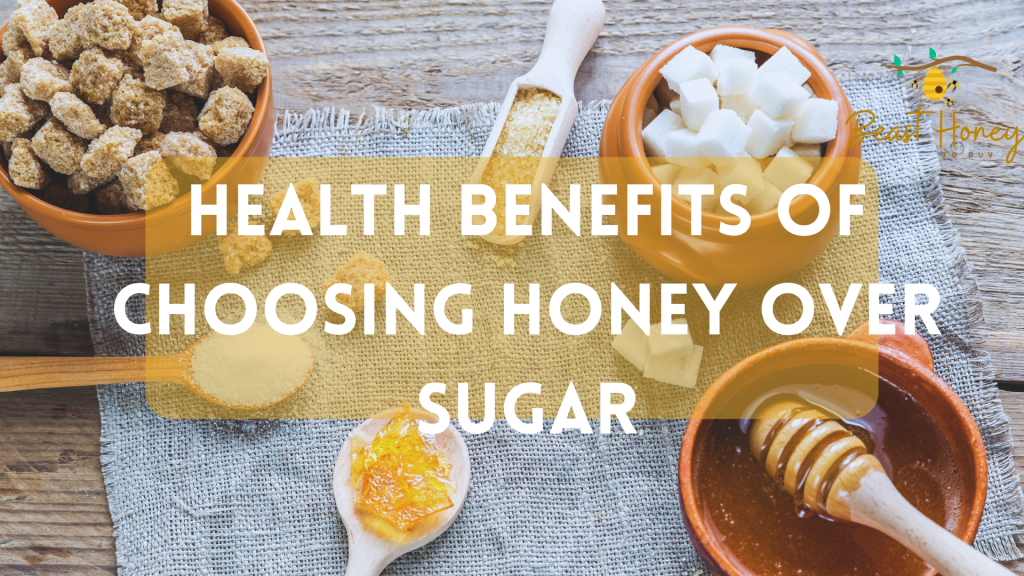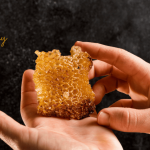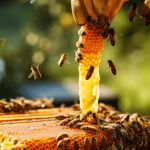Dubbed a superfood, honey is frequently a better option than those packets of white sugar.
However, some experts will tell you that honey isn’t the “healthiest” alternative to sugar.
Which is therefore more appropriate, honey or sugar? The advantages of honey and white sugar will be discussed in this article to help you decide which is better for your diet.
Two of the sweeteners that are most frequently used are honey and sugar. Both sugar and honey are carbohydrates primarily made up of fructose and glucose. They are ingredients in a lot of packaged foods and recipes.
Sugar and honey both give meals and snacks sweetness. They differ in terms of flavor, texture, and nutritional makeup, though.
On the other hand, their nutritional profiles, flavors, and textures vary.
The vitamin and mineral content of honey is marginally higher than that of white sugar; this effect is amplified when honey is soaked in sugar.
The pros and cons of honey and sugar for your diet and overall health are discussed in this blog post.
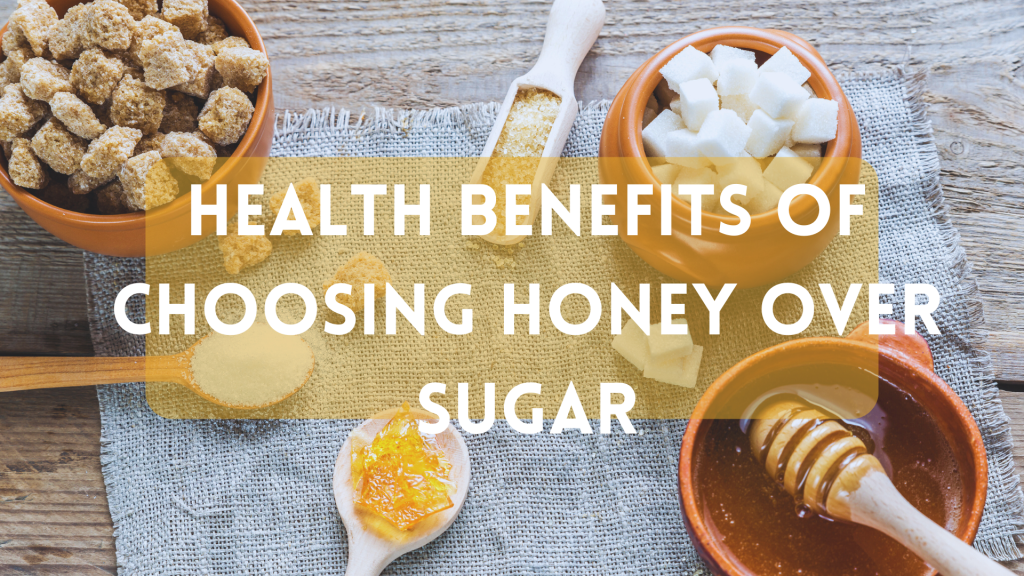
Comparison and contrast of sugar and honey
Both honey and sugar are carbohydrates made up of two different types of sugar: fructose and glucose.
Sweeteners include refined fructose, which is metabolized by the liver and associated with:
Overweight fat producing liver disease Diabetes Blood sugar spikes can result from the body’s rapid breakdown of fructose and glucose.
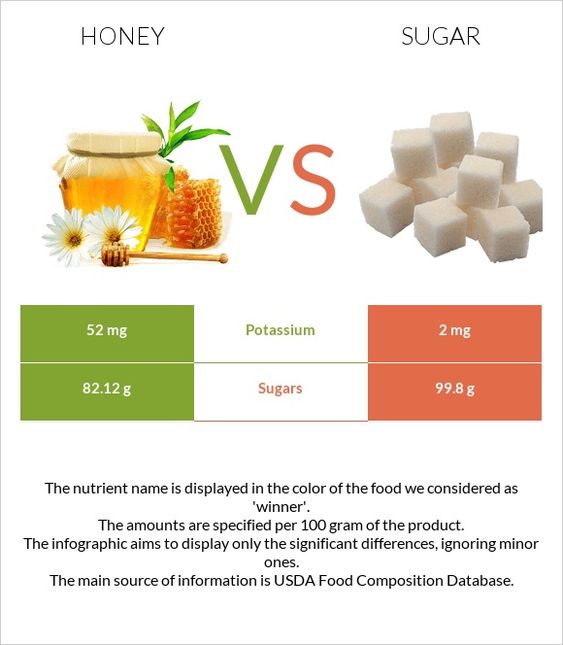
The glucose to fructose ratios in sugar and honey are different
Fructose and glucose make up half of the sugar. Thirty percent glucose and forty percent fructose are present in honey. What’s left over in honey is:
Pollen water from minerals, such as potassium and magnesium Some of the health benefits that honey provides could be attributed to these additional ingredients.
Compared to honey, sugar has a higher glycemic index (GI), which causes blood sugar to rise more quickly. Its higher fructose content and lack of trace minerals are the causes of this.
Although honey is sweeter than sugar, it contains a few more calories, so less may be needed. If either sweetener is used excessively, it can cause weight gain. A tablespoon of sugar contains 46 calories.
The Department of Agriculture states that there are 64 calories in one tablespoon of honey. While honey contains some essential vitamins and minerals, sugar does not. They are only found in extremely small amounts, though.
For example, 20 cups of honey would provide you with 100% of your recommended daily intake of zinc or potassium. That would be roughly 20,000 calories, or nearly two weeks’ worth of calories for some people.
The Glycemic Index of sugar and honey:
The GI, or glycemic index, indicates the rate and extent of blood sugar elevation following consumption of carbohydrate containing foods.
For a given carbohydrate, a higher glycemic index will cause your blood sugar to rise more quickly.
As per Harvard Medical School, sucrose, or sugar, has a glycemic index of 65.
Because the precise composition of honey varies, so does its glycemic index.
It was found to be 61 in one study that was written up in the journal Diabetes Care.
It is not safe to assume that honey is low because its glycemic index can range from low to high, and there is no way to know if it is low or high before you eat it.
It’s safer to presume instead that honey will have the same effect on your blood sugar levels as white sugar.
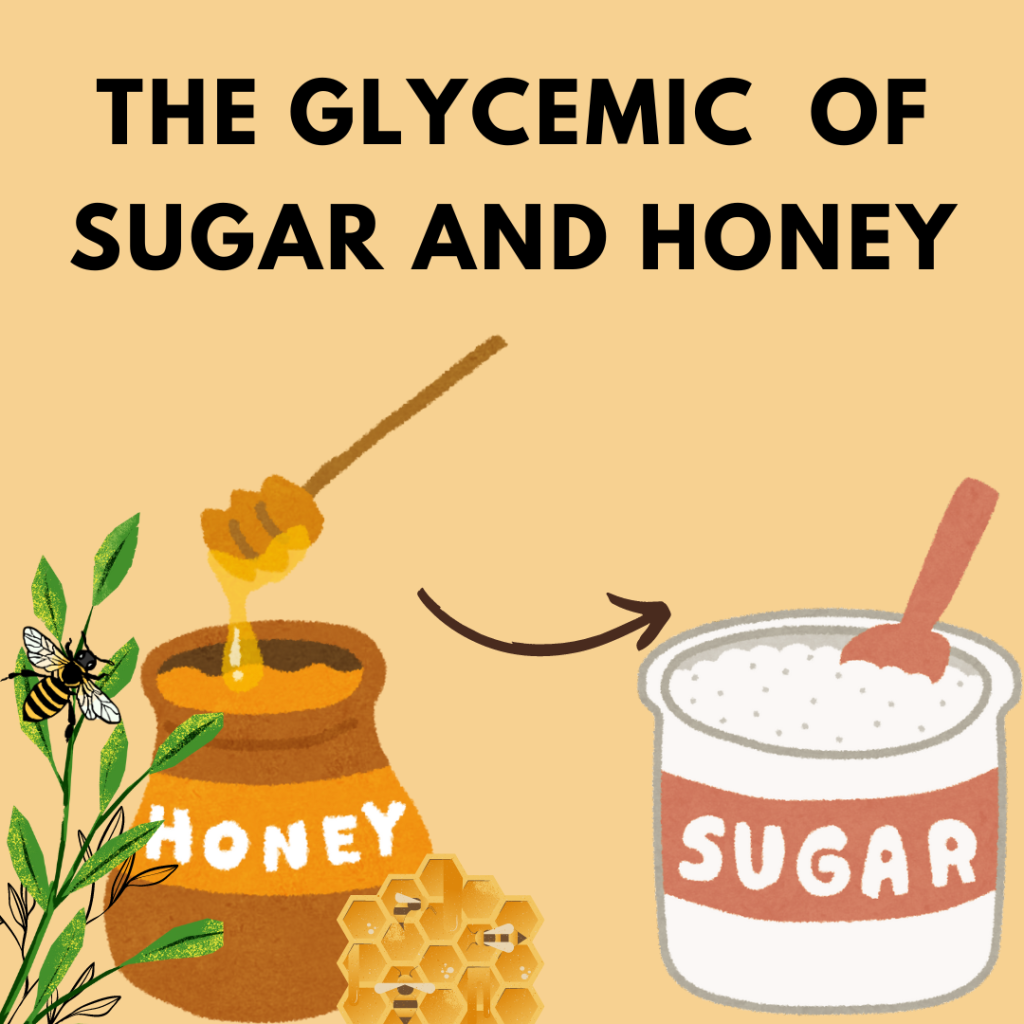
The advantages and disadvantages of honey
Advantages of Honey Since ancient times, honey has been used as a medication and sweetener.
The color of this viscous liquid, which honey bees secrete, varies from straw yellow to dark brown. To make honey, bees gather nectar from flowers, combine it with enzymes, and then store the mixture in hive cells to preserve its freshness.
There are several advantages linked to honey, including the following:
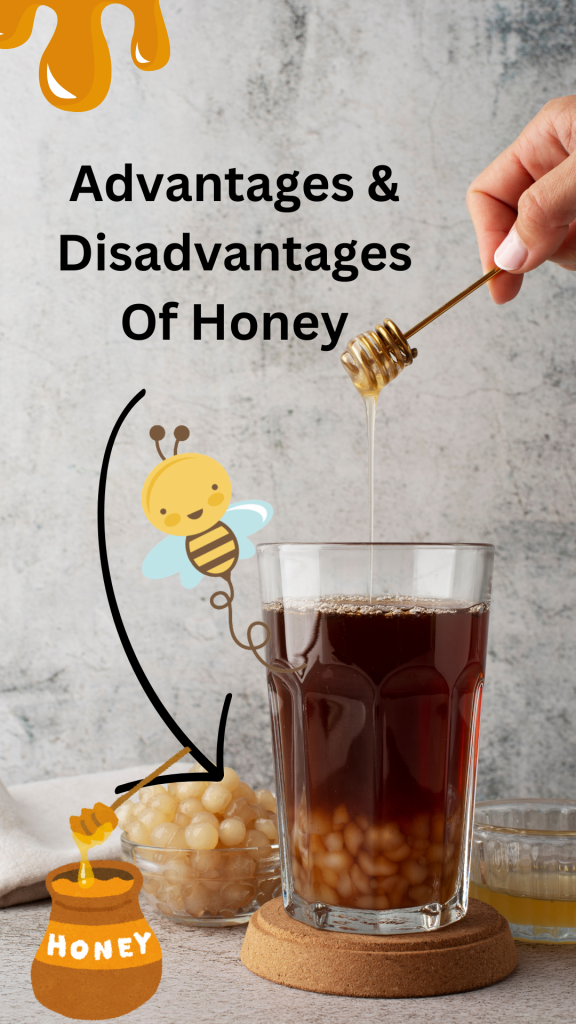
Less processed and more nutrients than sugar
Depending on where the nectar from which it is made is sourced, honey has different nutritional values. Small amounts of local pollen are typically present, along with other ingredients like:
Contains Amino Acids Minerals, vitamins, enzymes, and antioxidants According to certain research, dark honey has more antioxidants than pale honey.
Since honey is typically only pasteurized before use, it undergoes less processing than sugar.
In comparison to pasteurized honey, raw honey is more antioxidant and enzyme rich. It is also edible.
Suppressive medication for cough
According to some research, honey can help children with their coughs naturally.
According to one study, children with bronchitis who received dark honey instead of a placebo experienced greater symptom relief. The benefit is negligible, though.
Though some medications provide more symptom relief, honey is still preferable to having no cough at all, according to more recent research.
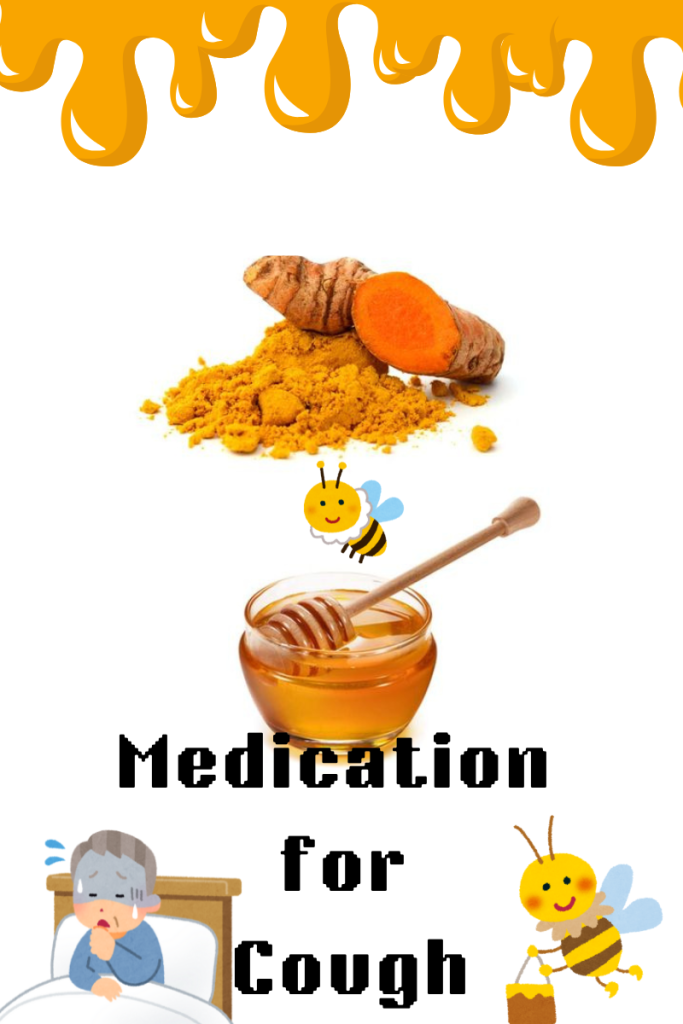
Relief from allergies
Anecdotal evidence suggests that honey sourced locally may be able to alleviate seasonal allergy symptoms.
Clinical research hasn’t always supported this, though. According to a 2011 study, those who drank birch pollen honey and had birch pollen allergy experienced the following symptoms:
60% less symptoms 70% fewer days spent experiencing severe symptoms twice as many days without symptoms Additionally, compared to a control group, they were able to take 50% fewer antihistamines.
Honey’s anti inflammatory and antioxidant properties may enhance these advantages.
As an alternative, introducing tiny doses of the allergen consistently can help the body become less sensitive to reactions in the event of an allergy.
Similarly, pollen that triggers seasonal allergies may be present in small amounts in local honey.
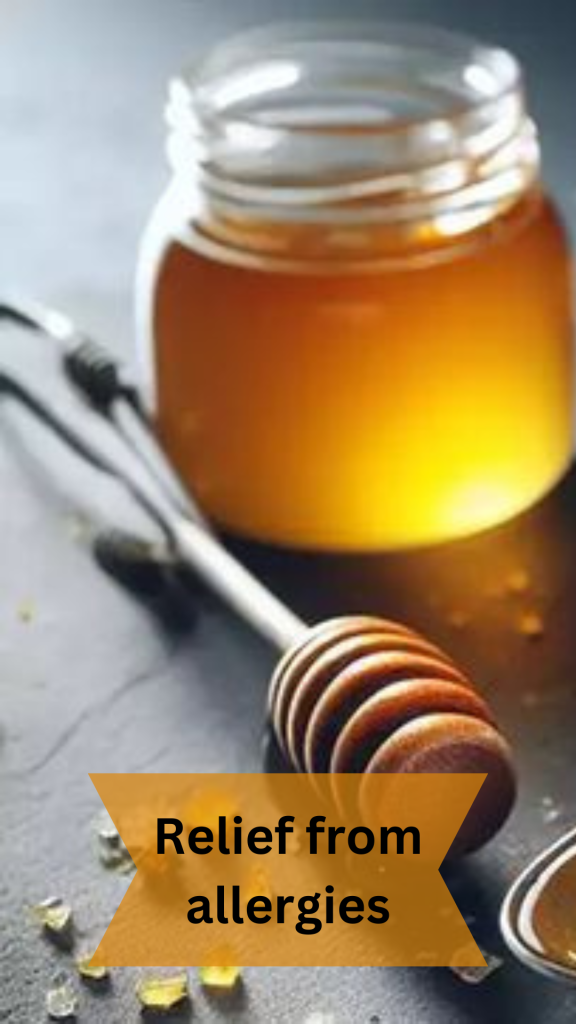
Treating injuries with opioids
Since honey has antibacterial qualities, topical application of honey has demonstrated benefits:
Healing of injuries
According to research, honey has a lot to offer when it comes to treating burns, sores, and chronic wounds naturally and safely.
Dermatitis seborrheica
An itchy and flaky scalp caused by seborrheic dermatitis is significantly improved by raw honey. Honey use on a weekly basis also prevented study participants’ condition related hair loss and reduced recurrence.
Much easier to digest
Compared to sugar, honey might be easier to digest. Regular sugar needs to be digested before it can be broken down because of its composition.
Honey is partially broken down and easier to digest when bees add enzymes to it.
There is a large selection of honey products on the market that you can afford.
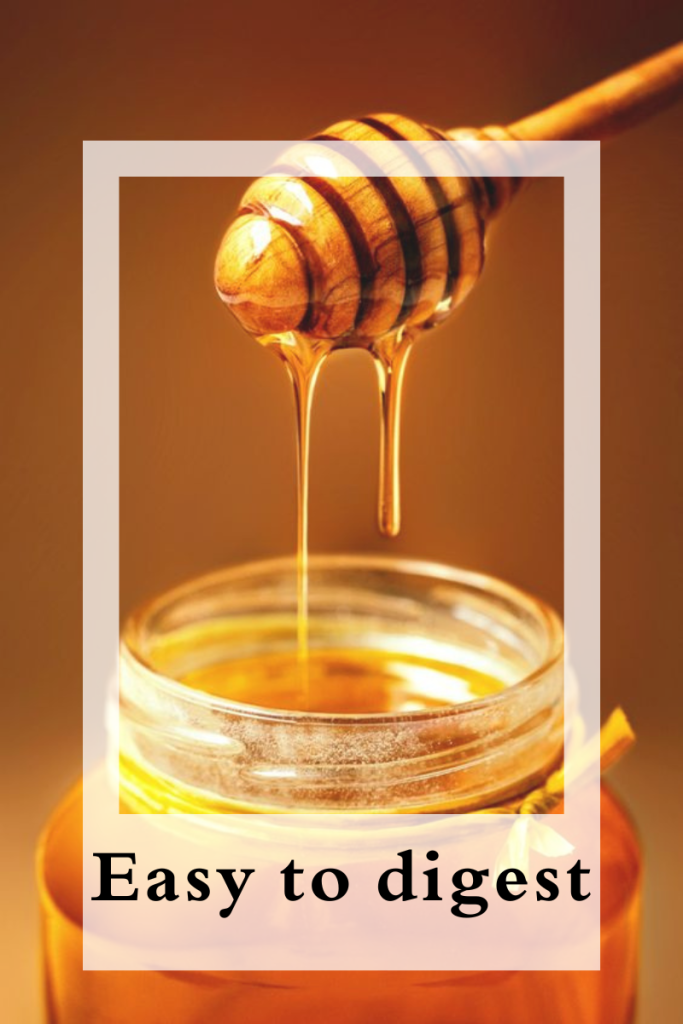
The drawbacks and dangers associated with honey The following are some of the most typical risks and drawbacks of honey:
high calorie content A tablespoon of honey has 64 calories, compared to a tablespoon of sugar’s 49 calories.
Poisoning risk in infants Giving honey to a baby younger than 12 months of age is not safe.
Babies can contract botulism, a rare but potentially fatal disease, from bacterial spores found in honey.
In older children and adults, the microbes that cause botulism in babies are harmless. Infant botulism symptoms include:
Constipation weakened muscles breathing difficulties Impacts on disease risk and blood sugar Sugar and honey both have comparable effects on blood glucose levels.
This is particularly problematic for those who are insulin resistant and have diabetes.
In healthy individuals, an excessive amount of honey can also cause blood sugar issues, raising the possibility of gaining weight Diabetes type 2 Cardiometabolic disorders.
Benefits and drawbacks of sugar
The benefits of sugar
Sugar beets or sugar cane are the sources of sugar. Sugar requires extensive processing even though it is derived from natural materials to become the finished product.
There are numerous varieties of sugar, such as:
Turbinado Raw Brown Muscovado White Powder The components of all these sugars are glucose and fructose, which combine to generate sucrose.
Nutrients are not added to sugar. On the other hand, brown sugar a mixture of white sugar and molasses, a byproduct of sugar production might contain trace minerals.
Some of the main advantages of eating sugar are
less caloric than honey
A tablespoon of honey contains 64 calories, compared to 49 in sugar. But since honey has a higher sweetness than sugar, you might need less to get the same amount of sweetness.
Long shelf life and low cost
Easy to obtain, inexpensive, and long lasting sugar. It is also a tantalizing staple in the store cabinet because it enhances the flavor of a wide range of foods.
Drawbacks and dangers of sugar A lot of risks and drawbacks are connected to sugar consumption.
The glycemic index is greater than that of honey
Compared to honey, sugar can raise blood sugar more quickly. This causes an abrupt drop in energy that is accompanied by headaches, exhaustion, and trouble focusing. It also causes a sudden spike in energy.
Elevated risk of type 2 diabetes and heart disease
A high sugar diet raises the risk of disease and is linked to weight gain and obesity. Consuming excessive amounts of sugar raises your risk of type 2 diabetes and heart disease.
You might be consuming more sugar than you realize because it’s a common ingredient in a lot of processed foods. Obesity and weight gain may result from this.
Sugar consumption should be monitored by diabetics because it can result in blood sugar spikes.
Other liver problems
Consuming large amounts of sugar can cause issues with liver function because the liver must metabolize refined fructose.
Among them are:
Fat liver disease without alcoholism (NAFLD) Controlling cholesterol Obesity
Teeth decay
A diet high in sugar accelerates the development of tooth decay and affects more teeth.
For everyone, this is accurate. To lower the risk of tooth decay, sugar should be avoided.
Modifications to the gut microbiome
Sugar rich diets are linked to less diverse and healthful gut flora. Additionally, it may make chronic diseases more likely.
More difficult to digest than honey
As previously mentioned, sugar is more difficult to digest because it lacks the same enzymes as honey.
Advice on reducing the use of sweeteners
According to the American Heart Association (AHA), men should consume no more than 150 calories from sugar per day (9 teaspoons), and women should not consume more than 100 calories from sugar per day (6 teaspoons).
It is significant to remember that these amounts include all sugars, including syrups and honey, as well as the amount added to processed and prepackaged foods.
Advice on reducing your intake of sugar and honey includes
Reduce servings by half: Instead of a full spoonful of honey or sugar, use half a teaspoon in drinks and cereals.
Cut baking sugar by one third (⅓); this will lessen sugar content without significantly affecting flavor or texture.
Apply sugary seasonings or extracts
Almond or vanilla extracts can give smoothies and baked goods a sweet taste without adding extra sugar. Some examples of sweet spices that can add sweetness without adding calories are nutmeg, ginger, and cinnamon.
Use mashed banana or unsweetened apple sauce in its place
You can use equal amounts of these natural fruit purees in place of sugar in baking and other recipes.
Fruit can help you satisfy your sweet tooth
Mangoes, bananas, fresh berries, and other fruits can help you satiate your sweet tooth without using sugar.
Another excellent option is fruit canned in water. Steer clear of syrup filled canned fruit. It is not advised to use alternative sweeteners to cut back on sugar consumption. We refer to these as non nutritive sweeteners.
Sucralose, aspartame, and saccharin are a few examples. Despite the FDA’s assertion that using these sweeteners is safe, new research indicates that they may:
a rise in the desire for sugar agitates the gut flora Insulin sensitivity is indirectly affected by the tastes and textures of these two common sweeteners.
You might discover that, while brown sugar adds moisture and molasses flavor to baked goods, honey tastes sweeter when used for morning toast.
To decide which is best for you, try each one out and keep track of how much you use.
Although honey might have a greater effect, excessive use of either sugar or honey can be harmful to your health.
Discuss your dietary requirements with your doctor and dietitian if you have diabetes, heart disease, or are concerned about managing your weight. They can provide you with guidance on creating the ideal diet for you.
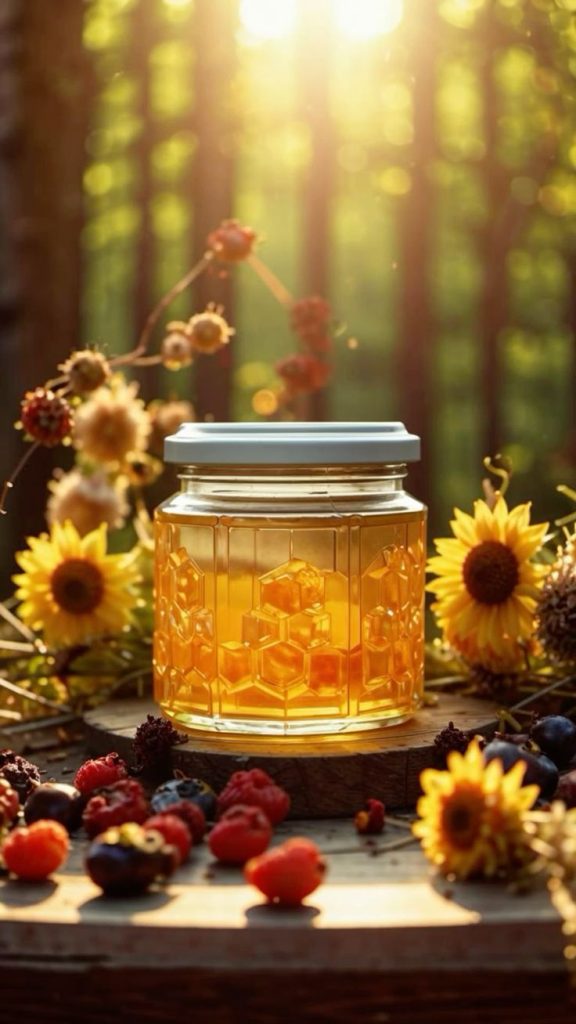
Choose the Healthier Options
Based on the aforementioned comparison, it is evident that consuming an excessive amount of sugar over time can lead to major health problems.
Although using honey excessively is also not advised, it is recommended that you include small amounts of honey into your diet on a daily basis.
And now for the crucial question: is it appropriate to use honey in place of sugar? Yes, is the straightforward response.
Despite having more calories than sugar, honey is sweeter and requires less to achieve the same level of sweetness.
An extra benefit is the presence of vitamins, minerals, and other essential nutrients. Because of its ability to strengthen immunity, it is especially advised during the current pandemic.
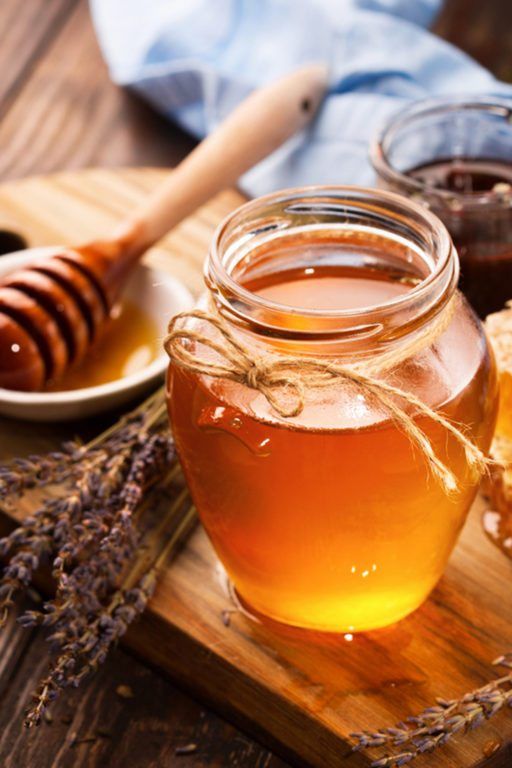
Types and Flavors
There are many different types of sugar, including brown, white, muscovado, turbinado, powdered, and raw.
The amount of molasses, crystal size, and processing level are the main distinctions between them.
Many natural flavors, including clove, ajwain, litchi, mustard, acacia, neem, sidr, eucalyptus, multiflora, and many more, are available in honey.
With their distinct health advantages, these flavors are all excellent additions to your regular diet.
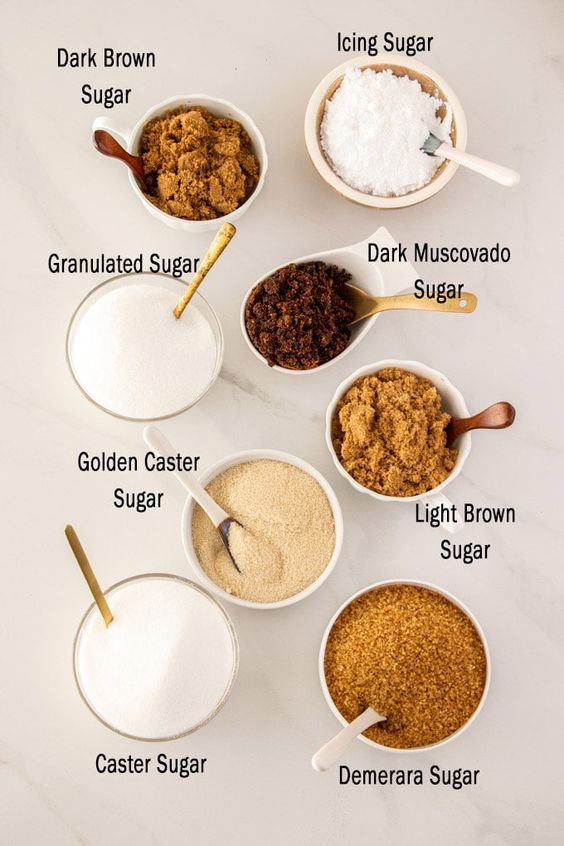
Conclusion
To receive all of the health benefits, raw honey which is unprocessed and unpasteurized must be chosen.
buy organic honey online from Vedic Honey to receive it in its purest form without adding any artificial sweeteners, such as sugar or corn syrup.
Therefore, choose our raw, unprocessed honey that is sustainably extracted from well maintained hives if you’re looking to buy honey in bulk.
